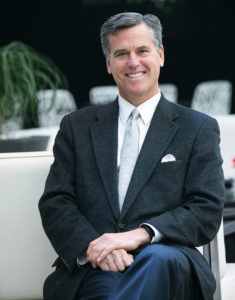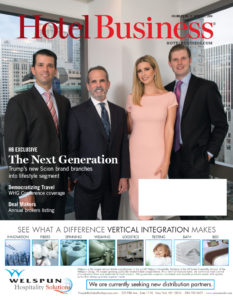 Oxford Capital Group’s recent $16.5- million purchase of a Hollywood site for its next Godfrey hotel continues its strategy of evaluating “smart real estate investments” in top markets across the U.S. for additions to its growing portfolio. We caught up with Oxford Capital Group and Oxford Hotels & Resorts Founder, President and CEO John Rutledge to uncover his thoughts on the future of the Chicago-based firm, the inner workings of successful real estate transactions and the impact of Airbnb on the hotel industry.
Oxford Capital Group’s recent $16.5- million purchase of a Hollywood site for its next Godfrey hotel continues its strategy of evaluating “smart real estate investments” in top markets across the U.S. for additions to its growing portfolio. We caught up with Oxford Capital Group and Oxford Hotels & Resorts Founder, President and CEO John Rutledge to uncover his thoughts on the future of the Chicago-based firm, the inner workings of successful real estate transactions and the impact of Airbnb on the hotel industry.
What made this site so appealing? We felt we had an attractive acquisition price, particularly for a fully entitled project. If we are right about our projected basis, our projected rates and occupancies, and the expected revenue and profitability of our food and beverage venues, we should generate an attractive risk-adjusted return on our all-in development costs.
Where will your next Godfrey branded hotel open its doors? We are actively evaluating many of the top 20 markets in the U.S., including South Beach, downtown LA, San Francisco, Seattle, Portland—many of the logical, large-scale urban markets, domestically. I couldn’t tell you if the next one will be in Miami Beach or San Francisco, but I can tell you, it’s likely to be in one of the top 10 markets as we execute our disciplined growth strategy in key strategic cities. We don’t have a goal to be a certain size by a certain time. We need to make sure we are making smart real estate investments. If we can’t find them, we will be perfectly content to stop expanding until we can again.
What should sellers seeking to do business with Oxford expect? We take pride in doing what we say we’re going to do, treating people courteously, transparently and being—hopefully—smart negotiators, but being civilized, ethical and professional in our dealings. I tell sellers, ‘We’re going to be friends before, during and after this transaction.’ I want them to be my reference in the future, so Oxford really goes out of its way to take the long view. We treat the brokers, the sellers and our joint venture partners that way.
You’ve been known to compare large-scale developments to multi-year journeys. What is the most challenging part of these ventures? Being able to find something compelling, and then to wrestle it down at a justifiable value because it’s a very competitive market. If it’s a compelling piece of real estate, we usually have many smart, capable competitors who are simultaneously underwriting the same transaction. We try to be thorough and creative in coming up with an edge, whether it’s an information edge or using our collective experience to have an insight that maybe somebody doesn’t have. Sometimes, it is having the courage of our convictions in the face of conflicting evidence, which may allow us to pay a more aggressive price because we have a sound business plan that will justify it.
How does Oxford purchase properties differently than its competitors? Doing a lot of work upfront; being stand-up people; moving quickly; being transparent with sellers; being professional with brokers; keeping our word. We have worked hard to develop a reputation of being good people to deal with, and people who can deliver on complex transactions. I would say our history and experience are really working in our favor more and more. As I have said to my internal team and our extended teams over the years: ‘Momentum begets more momentum.’ That really helps our cause because we’ve done so many complex projects around the country that people believe we’re a reduced execution risk. When they check our references, people keep telling us they hear we are good people to do business with.
Where does the firm expect to shift its geographic focus in the next five years? The East and West Coasts will continue to be significant focus areas. Selectively, Chicago and, perhaps, Minneapolis. Select areas in the south, including South Carolina and Florida, which are both tax friendly and seeing a lot of population and job growth.
Are you a risk taker in your personal life? I don’t view myself as a reckless risk taker; it’s having a sense of adventure. My wife and I have gone skydiving, scuba diving, elephant trekking and helicopter skiing. On the business front, I view the entrepreneurial journey as very similar. It’s an adventurous journey, but we do it in a very disciplined way. In the end, you have to believe in yourself and have the guts to take calculated risks.
What are Oxford’s strategies in dealing with the growth of Airbnb? I’m a big believer in innovation. It’s part of what makes western societies, in general, and America, in particular, so dynamic. Airbnb is here to stay. They are exploiting a market inefficiency and need. I believe people who rent out their apartments or homes should have to pay the same taxes hotels pay and provide a safe environment. As long as it’s a level playing field, I say, bring it on. It is a free world (mostly).
What’s your level of optimism going into 2017 for Oxford and the industry? We’re later in the economic recovery cycle and later in the lodging cycle. I don’t expect some massive correction, but I would say we’re increasingly cautious. I am concerned about the excess liquidity in the domestic and global economic systems. Central banks are printing too much money and diluting the value of our existing financial assets. We have been lucky to have a lot of growth and a number of successful round trips over the last several years and cycles. But I think it’s going to be harder and harder to find compelling opportunities. The good news is there isn’t a massive amount of new supply in most of the domestic and international markets, so I don’t think there’s going to be a macro or secular supply blowup. But I do think there are certain market that have already or will likely soon get out of balance for several years. Now is a time to be even more disciplined, patient and measured. HB

